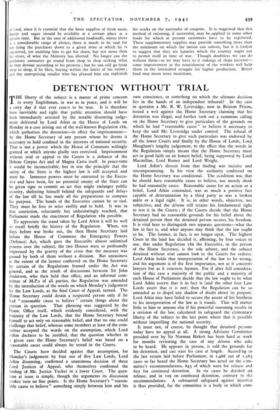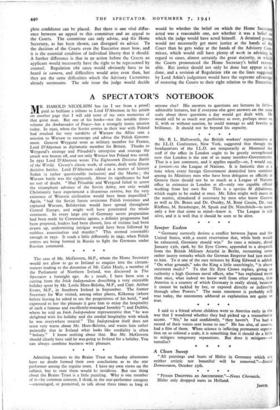DETENTION WITHOUT TRIAL T HE liberty of the subject • is
a matter of prime concern to every Englishman, in war as in peace, and it will be a sorry day if that ever ceases to be true. It is therefore born inevitable and right that public attention should have been immediately arrested by the notable dissenting judge- ment delivered by Lord Atkin m the House of Lords on Monday in a case arising out of the well-known Regulation 181s, which authorises the detention—in effect the imprisonment— by the Home Secretary of any person whom he deems it necessary to hold confined in the interests of national security. That is not a power which the House of Commons willingly granted or which anyone gladly sees exercised. Imprisonment without trial or appeal to the Courts is a defiance of the Habeas Corpus Act and of Magna Carta itself. In peace-time it would be inconceivable, but in war the principle that the safety of the State is the highest law is still accepted and must be. Immense powers must be entrusted to the Execu- tive and have been, for no potential enemy of the State can be given tine to commit an act that might endanger public security, sheltering himself behind the safeguards and delays of the law till he has made all the preparations to compass his purpose. The hands of the Executive cannot be so tied. They must be free to seize swiftly and to hold. It was in that conviction, reluctantly but unhesitatingly reached, that Parliament made the enactment of Regulation i8B possible.
To appreciate the stand taken by Lord Atkin it will be well to recall briefly the history of the Regulation. When, ten days before war broke out, the then Home Secretary laid before the House of Commons the Emergency Powers (Defence) Act, which gave the Executibe almost unlimited powers over the subject, the two Houses were so profoundly impressed by the gravity of the crisis that the measure was passed by both of them without a division. But uneasiness at the extent of the licence conferred on the Home Secretary by certain of the Regulations framed under the Act was general, and as the result of discussions between Sir John Anderson, who then held that office, and an informal com- mittee of M.P.s of all parties, the Regulation was amended by the introduction of the words on which Monday's judgement by the Law Lords, as the final Court of Appeal, turned. The Home Secretary could detain a suspected person only if he had " reasonable cause to believe " certain things about the person in question. That phrasing was suggested by the Home Office itself, which evidently considered, with the majority of the Law Lords, that the Home Secretary bound himself to act only on reasonable belief, and that no one could challenge that belief, whereas some members at least of the com- mittee accepted the words on the assumption, which Lord Atkin declares to be justified, that the question whether in a given case the Home Secretary's belief was based on a reasonable cause could always be tested in the Courts.
The Giurts have decided against that assumption, for Monday's judgement by four out of five Law Lords, Lord Atkin dissenting, confirmed a unanimous decision of three Lord Justices of Appeal, who themselves - confirmed the finding of Mr. Justice Tucker in a lower Court. The ques- tion at issue is simple, though the arguments its discussion evokes turn on fine points. Is the Home Secretary's " reason- able cause to believe" something simply between him and his own conscience, or something on which the ultimate decision lies in the hands of an independent tribunal? In the case in question a Mr. it W. Liversidge, now in Brixton Prison, issued a writ against the Home Secretary claiming that his detention was illegal, and further took out a summons calling on the Home Secretary to give particulars of the grounds on which he had " reasonable cause " to believe it necessary to keep the said Mr. Liversidge under control. The refusal of the Home Secretary to give such particulars was endorsed by all the lower Courts and finally by the House of Lords, Lord Maugham's lengthy judgement, to the effect that the words in the Regulation simply meant that the Home Secretary must act in good faith on an honest belief, being supported by Lord Macmillan, Lord Romer and Lord Wright.
Lord Atkin's dissent from that finding was incisive and uncompromising. In his view the authority conferred on the Home Secretary was conditional. The condition was that he should have reasonable cause to believe, not merely think he had reasonable cause. Reasonable cause for an action or a belief, Lord Atkin contended, was as much a positive fact capable of determination by a third party as was a broken ankle or a legal right. It is, in other words, objective, not subjective, and the eletenu still retains his fundamental right to test it in the Courts ; if the Courts decide that the Home Secretary had no reasonable grounds for his belief about the detained person then the detained person secures his freedom. It is vital here to distinguish two separate questions—what the law in fact is, and what anyone may think that the law ought to be. The former, in fact, is no longer open. The highest Court in the land has decided it, affirming, by four voices to one, that under Regulation 18s the Executive, in the person of the Home Secretary, is the sole arbiter, and the subject detained without trial cannot look to the Courts for redress. Lord Atkin holds that interpretation of the law to be wrong, and his argument is of the first importance, not as it concerns lawyers but as it concerns laymen. For if after full considera- tion of this case a majority of the public and a majority of each House of Parliament decide that the law ought to be what Lord Atkin asserts that it in fact is (and the other four Law Lords assert that it is not) then the Regulation can be so amended as to dispel any shadow of doubt about its purport. Lord Atkin may have failed to secure the assent of his brethren to his interpretation of the law as it stands. That will matter little to him or anyone else if his powerful reasoning results in a revision of the law, calculated to safeguard the elementary liberty of the subject to the last point where that is possible without imperilling the national security.
It must not, of course, be thought that detained persons today have no appeal at all. A strong Advisory Committee presided over by Sir Norman Birkett has been hard at work for months reviewing the case of any Menu who asks to be heard. He appears in person, is told the grounds for his detention, and can state his case at length. Accord:ng to the last return laid before Parliament, in 1,468 out of 1,583 cases so far heard the Home Secretary has acted on the cam- mittee's recommendations, 843 of which were for release and 625 for continued detention. In six cases he decided on release, and in 109 on continued detention, contrary to the recommendations. A substantial safeguard against injustice is thus provided, for the committee is a body in which com- plete confidence can be placed. But there is one vital differ- ence between an appeal to this committee and an appeal to the Courts. The committee can only advise, and the Home Secretary, as has been shown, can disregard its advice. To the decision of the Courts even the Executive must bow, and it is the essential condition of individual liberty that it should. A further difference is that in an action before the Courts an applicant would necessarily have the right to be represented by counsel. Regulation 18B cases would obviously have to be heard in camera, and difficulties would arise even then, but they are the same difficulties which the Advisory Committee already surmounts. The sole issue the judge would decide would be whether the belief on which the Home Secret acted was a reasonable one, not whether it was a belief o which the judge would have acted himself. A detained pers would not necessarily get more justice at the hands of the Court than he gets today at the hands of the Advisory Com_ mittee, which would still have plenty of work in advising in regard to cases, almost certainly the great rhajority, in which the Courts pronounced the Home Secretary's belief reason. able. But justice should not only be done but appear to be done, and a revision of Regulation 18B on the lines suggested by Lord Atkin's judgement would have the supreme advantage of restoring the Courts to their right relation to the Executive.























 Previous page
Previous page